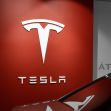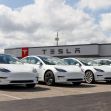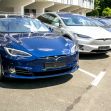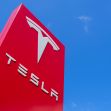Nyree Hinton, a California resident, has recently filed a class action lawsuit against Tesla, claiming the electric car maker is speeding up vehicle odometer mileage readings so that the vehicles fall out of warranty sooner. By doing this, Tesla is able to save on costly reparis because they don't have warranty coverage.
In his lawsuit, Hinton explains that the odometer readings on Teslas reflect driver behavior, energy consumption, and "predictive algorithms" instead of the actual mileage being driven, a practice he says in his lawsuit is not only unethical but goes against California laws on business practices.
He points to his 2020 Model Y that he purchased at the end of December 2022. At the time of purchase, the vehicle had 36,772 miles on it. He says that there was a period when his odometer reading detailed he was driving 72 miles a day when in reality he was driving at most 20 miles a day.
At this rate, Hinton's basic warranty coverage of 50,000 miles expired, leaving him stuck with a $10,000 suspension repair bill, a bill he argues Tesla should cover because the odometer readings were inflated to begin with.
The lawsuit describes Tesla's practice as a method that "manipulates and misrepresents the actual mileage traveled by Tesla vehicles." His lawsuit goes on, "By tying warranty limits and lease mileage caps to inflated 'odometer' readings, Tesla increases repair revenue, reduces warranty obligations, and compels consumers to purchase extended warranties prematurely."
The complaint also states that this practice erodes customer trust and is a fraudulent business practice that undermines the value of Tesla vehicles and their warranties.
The lawsuit includes several claims, including a violation of California Vehicle Code Section 28050, which prohibits odometer tampering. There are also claims for unjust enrichment and restitution, negligent misrepresentation, and other California business practice violations, as well as breach of contract.
Hinton is seeking compensatory damages for the financial losses he says he suffered as a result of Tesla's legal violations. He's also seeking punitive damages for all California drivers affected by the miscalculated odometer readings. This could potentially cover over 1 million Tesla vehicles in the state alone, according to legal documents.
This isn't the first time Tesla has been accused of falling short on customer promises. In 2024, the automaker was hit with a class action lawsuit over allegations that it inflated driving ranges for certain Tesla models. This prompted consumers to purchase higher cost vehicles, but also resulted in drivers not being able to travel the distances they were advertised their vehicle could go on a single charge. However, in March 2024, a federal judge in Oakland, California, ruled that drivers had to pursue their claims in individual arbitration, not through a class action.






